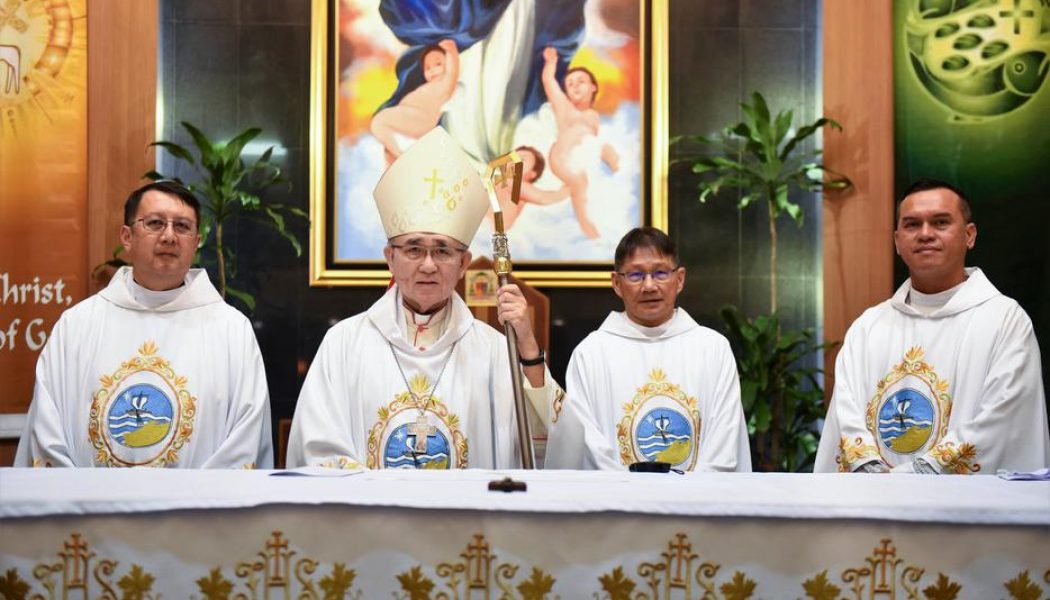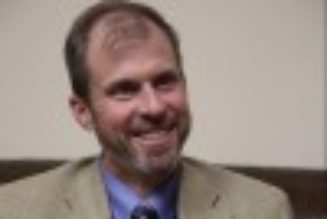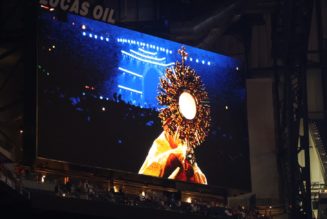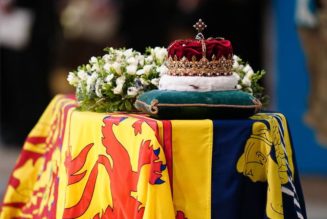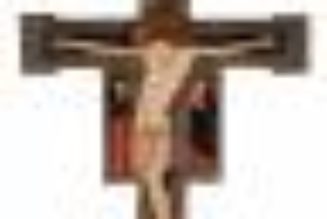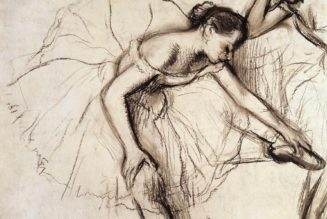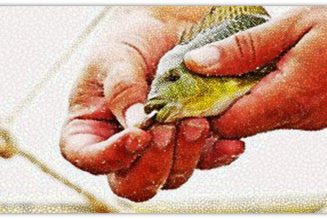
Bishop Cornelius Sim oversees the apostolic vicariate in Brunei Darussalam, a local Church with three Catholic parishes, three schools and just three Catholic priests in addition to himself, serving more than 20,000 Catholics. Bishop Sim, 69, is Brunei’s first native-born priest and bishop, as well as a 1988 graduate of Franciscan University of Steubenville, where he received his master’s degree in theology. According to the Ohio university, he was also the first graduate of Franciscan’s priestly discernment program to be ordained to the priesthood.
On Oct. 25, Pope Francis named Bishop Sim one of 13 new cardinals, to be created in a Nov. 28 consistory. The appointment is another first for Brunei, a country on the north coast of the island of Borneo in Southeast Asia. In this interview with the Register, Cardinal-designate Sim shares his story, how he made a decision to follow Christ, the experience of the Church in Brunei, and the centrality of personal witness to the Gospel that is necessary for the Church’s evangelization.
Bishop Sim, where were you when you found out Pope Francis had named you a cardinal?
I was getting ready for dinner, and as I sat down … a seminarian … showed me a text from his seminary rector [in the Philippines], and said, “Do you know anything about this?” I said, “It must be a joke. Don’t bother about it.” Then he started to get more texts from his seminarian friends, and I said, “This is a bit much.” So we decided to take a look at the internet. And we chanced on the Angelus, and to my horror, it was true! I just couldn’t figure it out. It seemed too farfetched, too surreal.
I’m still trying to figure out what it all means.
For the Church in Brunei, what’s the significance of this appointment to the cardinalate?
It’s what the Pope says: paying attention to the Churches on the peripheries; looking at the little communities of faith and not just the ones that make the headlines, but those communities that quietly live out their faith, almost anonymously unbeknownst to most people, but which nevertheless maintain their faith, carrying out faith formation, the foundation of the family, and make their contribution in their part of the world.
I suppose he wanted to bring some prominence to [show] that there is the Church in other forms in other places, and we could learn a thing or two from them.
What would you say are some of the challenges and beautiful things the Church has in Brunei?
We’re a minority, and we have to work within that framework of being small. We don’t draw that much attention to ourselves. But witnessing is more a question of living out your faith. Obviously there’s the wider world outside, and the Church inside, and while it may seem a paradox, we actually have a lot of freedom within our churches to do a lot of things. We share a public space with all kinds of religions. … It’s sort of a melting pot, and you have to learn how to fit in that kind of public space and recognize there is a common good we need to work together for. And if we have the ability to give something, it’s what we do.
But in many ways, we’re not that different from anywhere else.
There’s a tendency, especially among people in their 40s and 50s, to stop really practicing. They’re Catholics, but not really that fervent. … They don’t have that “on fire” faith. They’ve got it up here [in their head], with parts they’ve picked up from the catechism class or confirmation class from years ago, and think they know everything. And they make their decisions from stuff they hear from their peers, who are totally unqualified and have no idea they have even an immortal soul. The idea that there’s an eternity doesn’t seem to be something that grabs them, and they’re pretty intelligent. And the worry here, also, is that they pass this on to their kids, and the kids become mirror reflections of themselves. So how to convey faith to them?
So we try — our big emphasis is to focus on the family.
You’re the first priest and bishop who’s a native of Brunei. Where did your own discipleship of Jesus Christ begin?
There’s a little bit of the prodigal and homecoming in it. My family has been Catholic since my grandfather. He was the first to be baptized in our family and among the first in his town. They were always very close to the parish, the priest and the community. Life was always centered around the Church — just before the Second World War.
I was brought up in the Church. I went to Catholic school, was an altar server, in the Legion of Mary, and things like that until I finished high school. Then I went to get a diploma in engineering, and things kind of unraveled there for me.
I got into this whole idea that making money was the real thing. Then my father died, and the whole thing came crashing down. I realized that everybody has a beginning and an end, and what happens after that?
When I came back [from abroad a year later], our parish priest visited me and talked of God. I wasn’t that receptive at first. But he invited me to become part of the parish council, and I started to think this was the place [to find meaning]. And then he got me into a prayer meeting, and I started to realize, “This is for real.” It’s not just showing up for Mass and doing the novenas to St. Jude and all that. It was a bit more than that — it was personal and something you had to invest yourself in. So that really was my homecoming. It gave me that personal knowledge of Jesus Christ, that relationship with him. I began to read the Bible — you know, the classic signs!
My parish priest really guided me through those first five years when I came out of the “wilderness.” And he encouraged me to look at the priesthood, although it wasn’t on my radar.
I hung on to another five years at work. I was about to take on a large project, and then that next Sunday the bishop called me and said, “Hey, I have good news for you — you’re going to Steubenville!” [Reporter’s note: This was in reference to Franciscan University of Steubenville’s priestly discernment program. Cardinal-designate Sim is the first ordained graduate to go through the program.]
I said, “To what?” I didn’t know anything about the place. I thought it was a seminary. Obviously, it wasn’t. So Monday morning, I went to Mass — Aug. 17, 1985 — the priest read the Gospel of the Rich Young Man who was asked to sell everything he had [to follow Christ]. And I thought, “Oh, boy.” So I thought of faith, the road less traveled, and decided, “I’ll never know unless I bite the bullet and go” [to Steubenville]. So I quit my job that afternoon.
So you’re a graduate of Franciscan University of Steubenville. How did it prepare you for your priesthood and ministry in Brunei?
Steubenville is a good place. It gave me the theoretical and theological foundation that I needed. People were enthusiastic, on fire.
There were professors who could help you if you wanted to go deeper then what was in the syllabi and mentor you. Some showed up for class, and that was it. But there were professors in the philosophy department that would spend an hour or two with you. They’d listen to you; you’d listen to them. It was wonderful.
What happened after you graduated from Steubenville?
After I came out of Steubenville, I figured I would get another advanced degree in theology. And I had some offers to study here, but it didn’t work out. We had our Catholic priests who couldn’t work in Brunei anymore, their work permits were expiring, and some Catholic sisters who had to leave.
So the bishop said it was an emergency situation and decided to ordain me. I said, “Oh, no, no, no. I have all this stuff to work out.” But I did a retreat. It was one of those things where I thought really seriously about what God was asking of me. I thought of Abraham with Isaac on the altar, and I thought that whatever I wanted, I had to put that on the altar.
After all the priests left, I was on my own for several years, and I couldn’t do everything myself. I had three parishes, and it was almost impossible for me to do everything and be everywhere at the same time. So we had laypeople do Liturgies of the Word, to provide Holy Communion, to do all kinds of things. They did it amazingly well. It was a great period of bonding between priest and laypeople.
But that’s what Steubenville prepared me for!
Priests ministering to multiple parishes in the United States can derive some solace or inspiration from that.
Well, yes; and at the same time, there’s some things that only the priest can do. I mean Holy Week: For several years, I would do three Palm Sundays. I’d do one parish in the morning, another one at noon, and another one in the evening — Hosanna, and all the readings! And then for Holy Week, I was doing all the confessions. Sometimes confession would go on to 2am the following morning. There were so many people there. Then Holy Thursday, three — Good Friday was the same — and then Holy Saturday! Three Easter vigils in one night! But we baptized 100 people. And it took a lot of out of you, but those are some things that you just can’t ask of someone who is not a priest.
Is there a moment as a priest or bishop in Brunei that it came together for you: “Yes, this is why I’m here”?
It’s strange. Sometimes you’re ministering to somebody who perhaps is on his last legs. You’re giving them the last sacraments and Holy Communion for the last time, and you realize you’re with him as he moves completely out of this reality and to the next. And you realize that the priest has a role in which he’s kind of like a bridge between this world and the world of eternity.
There are times when people come to you, young people, who are looking for some reason why they ought to stay Catholic or why they should believe in God. And it’s good to be able to help them appreciate that God loves you and wants you to come to him … that you’re something, and you will spend eternity with God.
I talk with people who don’t practice: I pray for them and hope they figure it out. They’re not going to live forever. They’ll meet their Maker. I hope they don’t miss out on that adventure of knowing Jesus in person, coming to know him as someone who not just loves you as a disciple, but is totally invested in you, who died for you, and doesn’t want you to waste your life but wants you to lose your life in something good.
What keeps drawing people to Jesus Christ in Brunei today, to seek baptism and join the Christian community, that the Church everywhere can learn from?
I think it’s a witness again of a person living out their faith. … People come to the Church for all kinds of reasons, but they see something in the Gospel in the Catholic who lives it out in that [public] space; for example, the witness of praying; or by not just being “one of the boys” and contributing to dirty jokes. There are other ways, when opportunity arises, where we can share our faith in a direct way; but witness is an important form of evangelization.
This interview has been edited for length and content.
Join Our Telegram Group : Salvation & Prosperity
